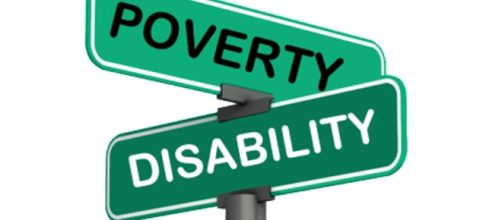The Equality and Human Rights Commission recently released a report on the life chances of British disabled people. It doesn't make for particularly hope-filled reading - especially if you are a person with a disability, or care for, love, or have basic human concern for a person with a disability.
Disability doesn't matter
That is something the Equality and Human Rights Commission report makes manifestly obvious. Disability means you're less than human, and consequently not entitled to basic human rights.
The Right to Life
Employers dislike hiring people with disabilities because we're expensive.
We demand accommodations, which cost money. We put up insurance premiums just for being on site. We need days off for hospital treatment. And, well - other people, normal people, have to look at us, and that's not nice, When someone is obviously disabled, it puts customers and clients off. It costs money.
So, unable to get meaningful, well-paid work, many disabled people are reliant on the government welfare scheme. In the UK, this pays a pittance - after you've jumped through several hoops, been ritually humiliated, viewed with suspicion, accused of lying, and told that your health issues "aren't that bad" - by people who don't actually live with anything remotely like them.
And disability, on its own, incurs additional costs.
Whether it's hospital parking for necessary appointments, taxi and bus fares because a disability precludes driving, additional equipment, rent of a suitable, accessible property (wheelchair users, for example, will need a ground floor property, usually with wider hallways and rooms - a bungalow, rather than a flat), or the costs of increased use of water (bathing incontinent adults, or people having to keep scrupulously clean because of infection risk) or gas/electricity (people with conditions such as arthritis, where keeping warm is important, throughout the year), and a need for specialist foods (such as gluten free.)
Disabled people in the UK are literally dying because they can't afford sufficient food: because they can't afford to get to medical appointments: because they can't afford basic bills.
Right to liberty
Disabled people do not get to choose where they live, unless they are fortunate enough to afford to own their own home. If you are disabled, you are either forced to accept the limited number of properties owned by private landlords that will accept housing benefit, and agree to making required adaptions. (There aren't many in either group and even fewer who fulfil both criteria), or have to accept whatever affordable housing is offered - with no attention being paid to whether you can drive, whether you are able to do some work, and therefore need to be close to centres of employment, where your existing support networks are, or anything that might make your life a little bit easier.
The Right to the Pursuit of Happiness
Disabled people in the UK are often too poor to pursue happiness. If they're not too poor, they're too ill and have too little support. It is difficult to get funding for individual, varied care needs. It is difficult to get support to access "non-essential" opportunities. Everything is about "how we can get you back to being a tax-payer" - happiness, and its pursuit, are not wealth-creating, and therefore disabled people shouldn't be allowed them.
Why care about disability?
Disability can happen to anyone - and therefore providing for those who experience it, adequately and appropriately, funding those things which will limit its impact on a person's life, and those initiatives and treatments which may even, one day, prevent it, or at least lessen the severity of the problems it causes, should be seen not as an onerous demand, but as a form of social insurance. Disability matters because it concerns people.

